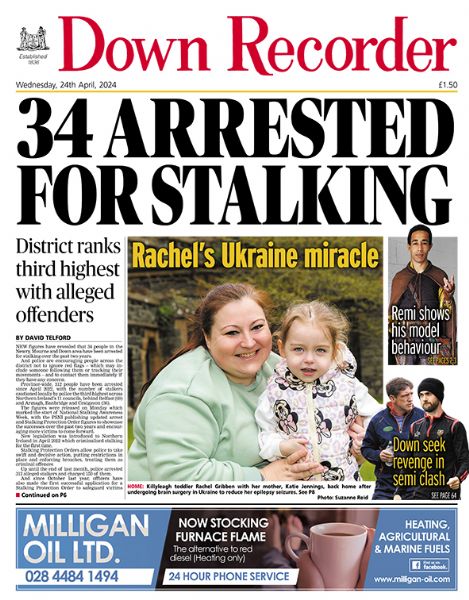Campaigners appeal for Downe stroke plan
Campaigners appeal for Downe stroke plan
17 April 2019
ARCHITECTS of the future direction of stroke services across the province have been asked to factor the Downe Hospital into their thinking.
Health campaigners have issued a fresh call for the Downpatrick hospital to be used as a so-called step down facility to assist stroke patients with their recovery after emergency treatment.
The call was first issued three weeks ago when it revealed that emergency care provision for stroke patients could be lost at a number of the province’s main hospitals, including Newry’s Daisy Hill, Dundonald’s Ulster Hospital, the Causeway in Coleraine, South West Acute Hospital in Enniskillen and Antrim Area Hospital.
At last week’s meeting of the Down Community Health Committee, campaigners reaffirmed their support for stroke rehabilitation services to be delivered in Downpatrick where an excellent medical team to deal with stroke patients is already in place.
Campaigners argue that the Downe is ideally placed to deliver a so-called step down facility for patients and hope their call is taken on board by those responsible for delivering a proposed a new model of stroke care by consolidating services in larger hyperacute units.
The proposals are currently out to public consultation and were discussed by campaigners last week, with those behind the proposals insisting that the future direction of travel will lead to better outcomes for patients.
Community health committee chairman Eamonn McGrady said the architects of the plan needed to tell local people face-to-face exactly what they were proposing for the future of stroke services, why it was good for the local community and what difference it will make.
He also expressed concern that in the material produced to coincide with the public consultation on stroke services, there was reference to support provided by the Northern Ireland Air Ambulance.
“We would need a lot of helicopters to cover all the people in Northern Ireland who might suffer a stroke at any point in time,” declared Mr McGrady. “A helicopter is wonderful and makes a real difference, but it only makes a real difference to a very small number of people.
“We have had years of under investment in the ambulance service in this area, both in capital spend for equipment, new rolling stock and staff. We also know that staff have been underpaid compared to their colleagues in England, Scotland and Wales.”
Mr McGrady said building an entire strategy for stroke treatment and recovery and to sell that to the rural community on the strength of an improved ambulance service, which the local area has required for more than three decades and never been able to get, caused him concern.
He declared: “It is simply not sufficient to say okay we will get you some more ambulances. How many, where and when? To try and roll all these things into place and not have demonstrated that you have the ambulance provision in place that is necessary is a worry.
“Ambulance cover at the minute does not meet the needs of our community; we are disadvantaged compared to most other communities across the North and in the South Eastern Trust area in particular. We all know of situations where ambulance cover has not been adequate.”
Mr McGrady said it would be great if the provision of the proposed hyperacute stroke units led to an improvement in the quality of life for those recovering from strokes.
However, he said what local people specifically want answers to is what impact the proposed change will have on them, especially those who live in rural areas.
“We need need to know what the truth of that is and the scientific evidence that proves that what is being proposed to deliver will be better for our community,” said Mr McGrady.
He added: “We demand a reversal of the injustices of health care provision in the past. We have a fantastic hospital in the Downe, but it is under-utilised and it is a scandal that its bed numbers have been reduced.
“So much more could be delivered at the Downe and indeed in Downpatrick where there is plenty of estate belonging to the public sector. Let’s get the new investment we need.”
It was also agreed at last week’s health meeting to write to Ambulance Service chief executive Michael Bloomfield asking for detailed information in relation to local ambulance response times. Mr McGrady said that if provided, the information should make an “interesting read”.

